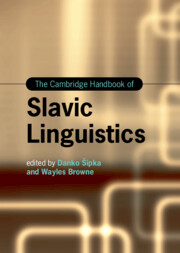Book contents
- The Cambridge Handbook of Slavic Linguistics
- Cambridge Handbooks in Language and Linguistics
- The Cambridge Handbook of Slavic Linguistics
- Copyright page
- Contents
- Figures
- Tables
- Contributors
- Introduction
- Part 1 Prosody and Phonology
- Part 2 Inflectional and Derivational Morphology
- Part 3 Syntax
- Part 4 Lexicon
- Part 5 Sociolinguistic and Geographical Approaches
- 26 Sociolinguistic Variation in Slavic Languages
- 27 False Cognates
- 28 Dialectal Fragmentation
- 29 Language Contacts
- 30 The Slavic Literary Micro-Languages
- 31 Heritage Language Forms
- 32 Scripts
- 33 Orthographies
- Part 6 Experimental and Quantitative Approaches
- Name Index
- Subject Index
- References
27 - False Cognates
from Part 5 - Sociolinguistic and Geographical Approaches
Published online by Cambridge University Press: 16 May 2024
- The Cambridge Handbook of Slavic Linguistics
- Cambridge Handbooks in Language and Linguistics
- The Cambridge Handbook of Slavic Linguistics
- Copyright page
- Contents
- Figures
- Tables
- Contributors
- Introduction
- Part 1 Prosody and Phonology
- Part 2 Inflectional and Derivational Morphology
- Part 3 Syntax
- Part 4 Lexicon
- Part 5 Sociolinguistic and Geographical Approaches
- 26 Sociolinguistic Variation in Slavic Languages
- 27 False Cognates
- 28 Dialectal Fragmentation
- 29 Language Contacts
- 30 The Slavic Literary Micro-Languages
- 31 Heritage Language Forms
- 32 Scripts
- 33 Orthographies
- Part 6 Experimental and Quantitative Approaches
- Name Index
- Subject Index
- References
Summary
This chapter addresses the phenomenon of false cognates in Slavic languages, i.e. words that sound alike but have different meanings, such as Polish brak ‘deficiency’ and Bulgarian brak ‘marriage’. Inter-Slavic false cognates are seen primarily as endpoints of diverging semantic and derivation processes in various Slavic languages. The chapter also discusses Slavic to non-Slavic false cognates, where in most cases diverging processes in lexical borrowing represent generators of this kind of relationship. False cognates thus provide important insights into all major processes of lexical enrichment. Pedagogical implications of false cognates in teaching Slavic languages are also presented.
Keywords
- Type
- Chapter
- Information
- The Cambridge Handbook of Slavic Linguistics , pp. 584 - 594Publisher: Cambridge University PressPrint publication year: 2024

